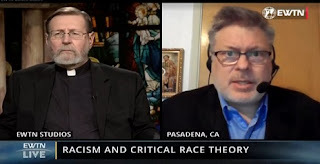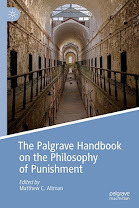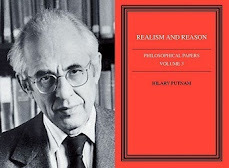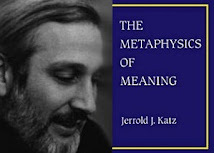Edward Feser's Blog, page 17
April 12, 2023
All One in Christ on EWTN Live
 Recently Irecorded an interview about my book
AllOne in Christ: A Catholic Critique of Racism and Critical Race Theory
forthe television program
EWTNLive
with Fr. Mitch Pacwa. The show airs today – at 5 pm Pacifictime, again at 10:30 pm, and then tomorrow morning (Thursday) at 7 am. The recording will be available for viewinglater at the show’s website and at YouTube.
Recently Irecorded an interview about my book
AllOne in Christ: A Catholic Critique of Racism and Critical Race Theory
forthe television program
EWTNLive
with Fr. Mitch Pacwa. The show airs today – at 5 pm Pacifictime, again at 10:30 pm, and then tomorrow morning (Thursday) at 7 am. The recording will be available for viewinglater at the show’s website and at YouTube.
April 6, 2023
Talking philosophy and natural theology
 Recently, onthe Thomistic Institute’s Off-Campus Conversations program, Fr. Gregory Pineand I had a discussion about Aquinas’s Five Ways, their metaphysicalpresuppositions, and the moral and spiritual preconditions of doing philosophywell. You can watch it at YouTube orlisten to it atSoundcloud.
Recently, onthe Thomistic Institute’s Off-Campus Conversations program, Fr. Gregory Pineand I had a discussion about Aquinas’s Five Ways, their metaphysicalpresuppositions, and the moral and spiritual preconditions of doing philosophywell. You can watch it at YouTube orlisten to it atSoundcloud.
April 5, 2023
Strawson on free will and interpersonal relationships
 In hisclassic paper “Freedomand Resentment,” P. F. Strawson addresses the question of whatdifference the widespread acceptance of determinism would make to our everydayways of dealing with each other. Hejudges that our commonsense conception of human behavior is too deeply rootedin our nature to be dislodged even in such a scenario. As in Strawson’s other work, he urges attentionto details of ordinary experience that are ineliminable but often overlooked byrevisionist systems of metaphysics.
In hisclassic paper “Freedomand Resentment,” P. F. Strawson addresses the question of whatdifference the widespread acceptance of determinism would make to our everydayways of dealing with each other. Hejudges that our commonsense conception of human behavior is too deeply rootedin our nature to be dislodged even in such a scenario. As in Strawson’s other work, he urges attentionto details of ordinary experience that are ineliminable but often overlooked byrevisionist systems of metaphysics.Strawsondistinguishes between what he calls the participantreactive attitudes that are the norm in interpersonal relationships, andthe objective attitude that can inexceptional cases supplant it. Let’sbegin with the first set of attitudes, which can be understood by reference tothe different ways we can harm or benefit each other, and the different ways wereact to these different harms and benefits.
Consider twooccasions, one in which someone deliberately pushes you, and the other in whichsomeone pushes into you by accident (as a result of tripping, say). The physical harm caused to you might be thesame in either case. But the first person’saction will generate in you a feeling of resentmentthat the latter person’s will not. Orconsider a case where you are stranded and a stranger gives you money for cab fare,and also a case where you are stranded and find some money that someone haslost and with which you can pay for a cab. The benefit to you will be the same in either case, but the first willproduce in you a feeling of gratitude thatthe second will not.
Actions thatproduce in you a feeling like resentment do so because you take it that whatmoves the other person to perform them are factors like malevolence, rudeness,indifference, contempt, or an intention to insult. Actions that produce in you a feeling likegratitude do so because you take it that what moves the other person to performthem are factors like kindness, goodwill, affection, and esteem.
Consideralso forgiveness. Strawson notes that this presupposes that theaction being forgiven was indeed appropriately met with resentment, but thatthe guilty party acknowledges this and repudiates the action. The forgiving person accepts this repudiationon the part of the offender and, in turn, cancels the resentment.
Resentment,gratitude, and forgiveness are “participant reactive attitudes” insofar as theyinvolve reacting to other human beings as fellow participants in a commoninterpersonal form of life. We see eachother, not as impersonal forces, but as rational agents having various beliefs,desires, and other propositional attitudes (as philosophers call them), asacting on the basis of these and thus subject to moral and rational appraisal,and as, accordingly, to be held responsible for the things we choose to do ontheir basis.
Within thisgeneral framework, various specific kinds of relationships exist – between familymembers, friends, lovers, colleagues, those who have some interest in common(such as a political cause or hobby), those we deal with temporarily in chanceencounters (such as a grocery store employee or a clerk at the post office),and so on. The nature of theserelationships determines the specific expectations we have of people, the waysthey might offend or please us, etc. Butthey are all variations on the same basic theme of regarding others as fellowpersons or rational agents, to whom it is appropriate to take the variousparticipant reactive attitudes.
Now, focusingon resentment in particular, Strawson says that there are, within thiscommonsense framework for dealing with others, two sorts of cases where resentmentat another person’s action can be removed or at least mitigated. First, there are the cases where, after morecarefully considering the matter, we make judgments of the kind expressed insentences like “He didn’t mean to,” “He didn’t know,” “He couldn’t help it,” “Hehad no alternative,” and so on. Wethereby absolve the person of responsibility. However, Strawson emphasizes, this is not because we judge that the participant reactive attitudes(resentment, gratitude, forgiveness, etc.) are not after all applicable to theperson. On the contrary, we believe thatthey are in general applicable to him,that he is a fellow member of the community of rational agents. Rather, we simply judge that in theparticular case at hand, the attitude of resentment is not after allappropriate. For though we initiallysupposed that the person’s action was the result of ill will, we later come tojudge that it was not.
Second, though,there are cases where we drop the attitude of resentment because we judge thatthe other person is deranged, or acting under compulsion, or that “He wasn’thimself,” or that he is just a small child. In other words, we attribute the person’s behavior to psychological abnormalityor immaturity, and for that reason judge that he does not bear the sort ofresponsibility required in order for an attitude of resentment to bereasonable.
Now in thissort of case, Strawson says, we do nottreat the person in question as a normal fellow member of the community ofrational agents, to whom it is appropriate to take the participant reactive attitudes. Here is where the “objective attitude” comesin. It involves not dealing with anotherin the ordinary interpersonal way, but instead as something to be managed, treated, cured, handled, trained, controlled, orthe like.
Think of theway we regard wind or rain that damages the house, or a stray neighborhood catthat leaves its droppings on the lawn. Wemight get angry at these things, but we don’t literally resent them, because we don’t conceive of them in the personalterms that alone could make such an attitude intelligible. Nor, for the same reason, do we literallyfeel gratitude toward wind and rainthat pass without leaving damage behind, or a cat that does its businesssomewhere other than the lawn. We manage or control a situation involving wind, rain, or a cat, rather thandealing with them the way we would a fellow member of the community of rationalagents.
When we takewhat Strawson calls the “objective attitude” to another human being, we dosomething similar. We judge that theperson has fallen from normal interpersonal capacity (in the case of severe psychologicalabnormality) or that he hasn’t yet risen to it (in the case ofimmaturity). And thus we see hisbehavior as something to manage or control rather than to feel resentment,gratitude, forgiveness, etc. toward.
Now, supposebelief in determinism became widespread in society, rather than something thatonly intellectuals thought much about. It might seem that the result would be the disappearance of the participantreactive attitudes. For those attitudespresuppose responsibility, and determinism might seem to undermine the viewthat people are responsible. But Strawsonthinks that while it may be possible in theory to abandon the participantreactive attitudes, in practice it could never happen.
For onething, he notes, accepting determinism would not entail abandoning attitudes like resentment for the usualreasons we cancel our resentment against another person. Again, there are two such reasons. First, we might judge that the person wasafter all acting out of goodwill rather than ill will. But accepting determinism would hardly leadus to conclude that all people are really after all always acting out of goodwill! It would not entail that anytime anyone doesanything, it’s because he didn’t know any better, didn’t mean it, etc. Second, we might judge that a person waseither psychologically abnormal or immature and thus not responsible. But accepting determinism would hardly leadus to conclude that all people are after all psychologically abnormal orimmature! So, again, determinism would notentail that we should extend our usual reasons for denying that someone isresponsible for an action to allpeople and all actions.
Strawson’spoint here seems to be that it is the context of our ordinary participantreactive attitudes that gives senseor intelligibility to our decisionnot to hold someone responsible. And thatcontext makes the denial of responsibility the exception rather than the rule. What we cannot plausibly do is extend this denial of responsibility sothat it becomes the rule rather than theexception.
Strawsonalso suggests that to abandon the participant reactive attitudes would entail alevel of “human isolation” that we are simply incapable of bearing. Imagine trying consistently to adopt theobjective attitude across the board to all human beings and all their actions –seriously regarding them as if they were like the wind, rain, or neighborhoodcat, something to be managed or controlled rather than sincerely reasoned with,grateful or resentful toward, etc. Itwould be like trying to think of them on the model of an AI device (Alexa orSiri) or an ATM machine rather than a real human being. Moreover, to be consistent you’d need to takethis attitude toward yourself aswell. This is psychologically impossibleand would lead to a mental breakdown if seriously attempted. The participant reactive attitude simply goestoo deep in human nature, no less than eating, sleeping, perceiving, andwalking do. It is, Strawson says, notsomething we can simply choose either to accept or reject.
To expand onStrawson’s point, we might note that the participant reactive attitude goes so deep that it is evident even in the behaviorof those who deny the reality of free will, and indeed even in the very act ofdefending this denial and drawing implications from it. For example, those who claim (quitemistakenly) that neuroscience or some other scientific finding shows freewill to be illusory try to convince people who disagree, sometimes accuse themof intellectual dishonesty if they resist, may express contempt for them andtheir purported ignorance, etc. None ofthis is consistent with the denial of free will. If people don’t have free will, then whileyou may speak to them as if you arereasoning with them (as you might with a dog or an AI like Alexa), you cannotreally do so. Nor can you blame them forremaining unconvinced by your arguments if they are simply unfree in everythingthey think and do, including in their persistence in believing that they arefree.
Those whoclaim that free will is illusory also often take this to entail that we shouldabandon the notion of responsibility and, consequently, the institution ofpunishment. But as Strawson’s analysisimplies, to give up the participant reactive attitudes would entail abandoning farmore than just that. We would also haveto give up attitudes like resentment, gratitude, and forgiveness, along withpraise and blame of any kind, any attempt to reason with others, and soon. Again, to be consistent we wouldhave to adopt the “objective attitude” wholesale, treating others and ourselvesas things to be managed or controlled, just as we would the wind and rain, adog, an ATM machine, or the like. Thereis nothing special about punishment,specifically, that makes it intelligible why we would give that up but keep most of the other aspects of the participant reactiveattitude. It all goes, or none of itdoes. And as Strawson says, it simply isn’tpossible for it all to go.
Exactly whatare the metaphysical implications of Strawson’s analysis? It could be taken in different directions. For example, one could (though I certainlywould not) interpret it in a compatibilistway, holding that we are free as long as we do what we want to do withoutexternal compulsion of the ordinary kinds, but where this does not rule out ourwants being themselves determined. Onecould take it in a Kantian direction, holding that it shows that we must ofnecessity think of ourselves as if weare free, but where this falls short of a metaphysical demonstration that wereally are free. Or one could take it to provide theingredients for such a demonstration, an argument to the effect that denyingfree will is ultimately incoherent.
I am partialto the latter approach, though demonstrating the reality of free will is atopic for another time. (In fact it isone of the many topics addressed in the book on the soul that I am working onand hope at last to finish by the end of the summer.)
April 1, 2023
All One in Christ on Bookmark Brief
 Recently Irecorded interviews about my book
AllOne in Christ: A Catholic Critique of Racism and Critical Race Theory
for the television programs EWTN Liveand EWTN Bookmark. They will be aired in the coming weeks, but apreview of the Bookmark interview hasalready appeared on Bookmark Briefwith Doug Keck. You can view it here.
Recently Irecorded interviews about my book
AllOne in Christ: A Catholic Critique of Racism and Critical Race Theory
for the television programs EWTN Liveand EWTN Bookmark. They will be aired in the coming weeks, but apreview of the Bookmark interview hasalready appeared on Bookmark Briefwith Doug Keck. You can view it here.
March 28, 2023
McCaig and Reilly on All One in Christ
 At Twitter, Bishop Scott McCaig kindly recommends my book
All One in Christ: A Catholic Critique of Racism and Critical Race Theory
. He writes:
At Twitter, Bishop Scott McCaig kindly recommends my book
All One in Christ: A Catholic Critique of Racism and Critical Race Theory
. He writes: A devastating critique of CRT and a clear Catholic response to the evils of racism. A real eye-opener! The incompatibility of CRT with the Faith, its numerous logical errors, and it’s deeper entrenching of racism into societal fabric could not be clearer. Please read.
In the Winter issue of the Claremont Review of Books, Robert R. Reilly kindly reviewsthe book. From the review:
Feser’s [book] is an important rejoinder, delivered in an accessible way for a wide audience, not just specialists and Catholics…
In his chapter on “Philosophical Problems with Critical Race Theory,” he exposes the myriad logical fallacies in CRT’s central arguments. He takes no prisoners.
For those who have not paid attention to the pronouncements of CRT’s academic exponents, Feser’s chapter on “What is Critical Race Theory?” is eye-opening. On the evidence he presents, CRT seems to be little more than a giant tautology…
This book deserves a wide audience. Its powerful arguments will empower the reader to confront CRT insanity, help roll it back, and prevent its further advances.
The philosophy of capital punishment
 My essay “The Justice of Capital Punishment” appears in
The Palgrave Handbook on the Philosophy of Punishment
, edited by Matthew C. Altman. You can view the anthology’s table of contents and other information about it at the publisher’s website.
My essay “The Justice of Capital Punishment” appears in
The Palgrave Handbook on the Philosophy of Punishment
, edited by Matthew C. Altman. You can view the anthology’s table of contents and other information about it at the publisher’s website.
March 25, 2023
Putnam on reason, reductionism, and relativism
 Naturalism holds that what is real is what can be accounted for in terms acceptable to science. More or less the orthodoxy in contemporary intellectual life, naturalism is a purportedly less crude descendent of what was traditionally known as materialism. For the materialist, matter alone is real, so that anything that is both real and seems to be different from matter (mind, for example) must somehow really be material after all. In modern times, matter is often conceived of on the model of particles in motion, so that “materialism” connotes the idea that everything real is really nothing but particles in motion.
Naturalism holds that what is real is what can be accounted for in terms acceptable to science. More or less the orthodoxy in contemporary intellectual life, naturalism is a purportedly less crude descendent of what was traditionally known as materialism. For the materialist, matter alone is real, so that anything that is both real and seems to be different from matter (mind, for example) must somehow really be material after all. In modern times, matter is often conceived of on the model of particles in motion, so that “materialism” connotes the idea that everything real is really nothing but particles in motion. Not all naturalists would put things that way, because the “special sciences” (i.e. everything other than fundamental physics) make reference to entities that, it is widely acknowledged, cannot be smoothly reduced to collections of particles. Hence for many naturalists, something is real if it can be fitted into the ontology of at least some special science or other, even if not strictly reducible to the particles recognized by fundamental physics. Hence, when philosophers speak of the project of “naturalizing” this or that phenomenon (mind, moral value, or whatever), what they mean is showing that it can be accounted for in terms of the concepts recognized by some science.
The late, great Hilary Putnam made an influential contribution to the project of naturalizing the mind with his version of functionalism. But in his later work he grew highly critical of this project. One example among many would be his essay “Why Reason Can’t Be Naturalized,” which is available in his Realism and Reason: Philosophical Papers, Volume 3. To be more precise, what he criticizes in this essay is the view that our capacity for knowledge, specifically, can be naturalized. (In other work, he developed important criticisms of naturalistic theories of other aspects of the mind, such as his own earlier functionalist theory and naturalistic theories of intentionality.)
Putnam’s specific targets in this essay are evolutionary epistemology, Alvin Goldman’s reliabilism, W. V. Quine’s naturalized epistemology – and, most interestingly, cultural relativism, which he perceptively characterizes as a kind of naturalism.
Against evolutionary epistemology, Putnam objects that natural selection favors survival value rather than truth or even rational acceptability, and that there is no essential connection between the former and the latter. A belief could be true or rational and yet be the opposite of conducive to survival, and it could facilitate survival while being false and contrary to canons of rationality. Hence appeal to natural selection cannot suffice to explain our capacity for knowledge. Variations on this sort of objection have been developed by Alvin Plantinga and others, and I have discussed it elsewhere (for example, hereand here).
The basic idea of reliabilism is that a belief is rational if it was produced by a reliable method for arriving at beliefs. Against this, Putnam deploys the following example. Suppose, he says, that the Dalai Lama is infallible on matters of faith and morals, so that any beliefs accepted on the basis of his authority would be produced by a method that is 100% reliable. Suppose further that one of the beliefs a person adopted this way was the belief that the Dalai Lama is infallible on matters of faith and morals. Obviously, this person’s belief would in that case have been adopted on the basis of circular reasoning. But reliabilism would have to conclude that it is nevertheless rational, because it would have been produced by a reliable method.
Quine’s naturalized epistemology, Putnam says, entails the elimination of all normative notions from the theory of knowledge (even if Quine later resisted this characterization). It abandons considerations about what we are justifiedin believing, warranted in asserting, have a good reason to think, etc. and simply focuses on how we do in fact happen to come to believe whatever we do. But consistently to eschew normative notions would require also abandoning the notion of truth itself. Hence a consistent naturalized epistemology would have to deny that any position is true, including naturalized epistemology itself.
Naturally, Putnam says much more than this about these views, but most interesting, again, is what he says about cultural relativism. Cultural relativism holds that there are no criteria of truth, justification, rationality, etc. that transcend one’s culture (or one’s language, or one’s historical epoch, or what have you). What is true, justified, rational, etc. relative to one culture’s standards will not be true, justified, rational, etc. relative to another’s. And that is all that can be said. To ask “But which culture’s standards are the right ones?” would presuppose that there is some neutral or objective higher-level standard by reference to which the standards of different cultures could be judged, and that is precisely what the cultural relativist denies. We cannot get outside our cultures and adjudicate between them from some culture-independent point of view. If it seems that we can, that is itself merely because we are looking at things from the point of view of a culture that believes in culture-transcendent standards.
Putnam suggests that this is essentially just another variation on naturalism, even if it is not often recognized as such. He writes:
Cultural relativists are not, in their own eyes, scientistic or ‘physicalistic’. They are likely to view materialism and scientism as just the hang-ups of one particular cultural epoch. If I count them as ‘naturalized epistemologists’ it is because their doctrine is, none the less, a product of the same deference to the claims of nature, the same desire for harmony with the world version of some science, as physicalism. The difference in style and tone is thus explained: the physicalist’s paradigm of science is a hard science, physics (as the term ‘physicalism’ suggests); the cultural relativist’s paradigm is a soft science: anthropology, or linguistics, or psychology, or history, as the case may be. That reason is whatever the norms of the local culture determine it to be is a naturalist view inspired by the social sciences, including history. (p. 235)
Putnam notes that the most important cultural relativists often deny that they are cultural relativists. He cites Richard Rorty and Michel Foucault as examples of thinkers whose views he thinks in fact entail cultural relativism even if they do not characterize them that way.
As Putnam emphasizes, cultural relativism simply cannot be rescued from the charge of incoherence. Even to formulate their thesis, cultural relativists need, as it were, to stand outside the perspective of all cultures and claim to observe that there is no culture-transcendent perspective outside of them – which is, needless to say, a self-contradictory exercise. Or if they consistently eschew such a culture-independent perspective, they will have to conclude that cultural relativism itself is nothing more than the expression of the cultural relativist’s own parochial perspective, which no one else has any reason to take seriously.
Putnam takes relativism to be “a far more dangerous cultural tendency than materialism” (p. 235). Neither view can account for knowledge and rationality, but materialism at least tends to pay lip service to them. Cultural relativism, by contrast, reflects a “deep irrationalism,” and also encourages a frivolous intellectual mindset according to which “the deep questions of philosophy are not deep at all… that philosophy, as traditionally understood, is a silly enterprise” (pp. 235-36). This is inevitable given that philosophy is ultimately concerned precisely with the objective standards of truth and rationality that relativism rejects.
Developing the point that relativism is incoherent, Putnam notes an interesting parallel with methodological solipsism. This approach (associated, for example, with Rudolf Carnap’s Der logische Aufbau der Welt) analyzes all reality into constructions out of one’s own experiences. For example, tables, chairs, rocks, and trees are on this view nothing more than collections of the experiences I have of these things. This might sound like solipsism full stop – the view that I and my experiences are all that really exist – but the difference is that the methodological solipsist holds that each of us can carry out the same analysis for ourselves, which implies that there are subjects of experience other than oneself.
The trouble, Putnam notes, is that this is incoherent. If I regard everything as a construction out of my experiences, then it follows that all other people and their experiences are merely constructions out of my experiences. For example, you are nothing more than a construction out of my perceptual experiences of your body, and your experiences are nothing more than a construction out of my perceptual experiences of you talking about your experiences, behaving in certain ways, and so on. Hence there really are no other subjects of experience, when the view is worked out consistently. Methodological solipsism collapses into solipsism full stop.
Now something analogous is true of cultural relativism, as Putnam argues. At first it seems as if the cultural relativist recognizes a plurality of cultural perspectives and regards them all as equally valid. But this is an illusion. For if there are no criteria of truth, justification, rationality, etc. over and above cultural perspectives, then to be consistent, the cultural relativist must regard the criteria of truth, justification, rationality, etc. that characterize his own cultural perspective as the only genuine criteria there are. For if he is consistent, he will have to hold that he can no more transcend his own perspective than anyone else can. To be sure, he will note that others have different perspectives, but he will have to regard them as simply mistakenperspectives, because they conflict with his own perspective and, again, he can have no criteria for truth, justification, rationality, etc. other than his own.
In this way, Putnam concludes, just as methodological solipsism collapses into solipsism without qualification, cultural relativism collapses into cultural imperialism. The cultural relativist must regard his own perspective as the only correct perspective. Hence he is not really a relativist at all.
Putnam notes that there are two opposite extreme errors to be avoided vis-à-vis the relationship between reason and culture, and both neglect the fact that reason is immanent to culture in one respect while transcending it in another. On the one hand, there are those who have too simplistic and exaggerated a view of the independence of reason from contingent cultural and historical circumstances. Putnam cites logical positivism as an example. But the cultural relativist goes to the opposite extreme of entirely submerging reason in culture and historical circumstance. The boring but sober middle ground position is that while our rationality is always exercised in ways that reflect concrete cultural and historical circumstances, it can nevertheless stand back from them and evaluate them critically by reference to criteria that transcend those circumstances. We cannot coherently deny this.
Though Putnam does not note it, there is a parallel here to the Aristotelian conception of the human intellect and its relationship to our bodily nature. On the one hand, the Aristotelian rejects the Platonic-Cartesian view that the mind is radically independent of the body, and its concepts built into it independently of experience of the concrete natural world. Rather, there is nothing in the intellect without prior sensory experience, and even after the intellect is furnished by experience it continually needs the assistance of sensation and mental imagery even when entertaining the most abstract notions. On the other hand, the Aristotelian rejects the materialist view that human beings are entirely corporeal. The formation of concepts involves a kind of dematerialization of the mind’s objects, stripping form entirely out of its concrete material embodiment and considering it in isolation. And the intellect can do this precisely because it is itself an immaterial power.
Though Putnam has himself emphasized the way that the abandonment of the Aristotelian-Scholastic conception of the mind’s relationship to the world poses problems for modern theories of mind, he has also stopped short of advocating a return to it. But one of its advantages is precisely that it accounts for how reason can be both immanent to and transcendent of culture and history in the ways Putnam has noted.
Related posts:
Putnam on causation, intentionality, and Aristotle
Putnam and analytical Thomism, Part I
March 18, 2023
How to define “wokeness”
 A common talking point among the woke is the claim that “woke” is just a term of abuse that has no clear meaning. Whether many of them really believe this or are just obfuscating is not clear, but in any event it isn’t true. I would suggest that what critics of wokeness have in mind is pretty obviously captured in the following definition:
Wokeness
is a paranoid delusional hyper-egalitarian mindset that tends to see oppression and injustice where they do not exist or greatly to exaggerate them where they do exist.
A common talking point among the woke is the claim that “woke” is just a term of abuse that has no clear meaning. Whether many of them really believe this or are just obfuscating is not clear, but in any event it isn’t true. I would suggest that what critics of wokeness have in mind is pretty obviously captured in the following definition:
Wokeness
is a paranoid delusional hyper-egalitarian mindset that tends to see oppression and injustice where they do not exist or greatly to exaggerate them where they do exist. Examples would be: Characterizing as racist “microaggressions” behaviors that in fact are either perfectly innocuous or at worst just ordinary rudeness; condemning some economic outcome as a racist “inequity” despite there being no empirical evidence whatsoever that it is due to racism; condemning as “transphobic” recognition of the commonsense and scientific fact that sex is binary; condemning as “racist” the view that public policy should be color-blind and that racial discrimination is wrong whatever the race of the persons being discriminated against; condemning as “antigay” the view that it is not appropriate for grade schools to address matters of sexuality in the classroom without parental consent; and so on.
If you’re thinking “Wait, what’s wrong with any of that?,” you’re probably woke and should seek help, because these are deeply irrational attitudes. My book All One in Christ: A Catholic Critique of Racism and Critical Race Theoryexplains what is wrong with much that presents itself as “antiracist” but is in fact nothing of the kind. (You will find much of the book useful even if you are not Catholic, because the argumentation is largely of a philosophical and social scientific nature rather than a theological nature.)
By characterizing wokeness as paranoid and delusional I am not flinging terms of abuse, but describing real psychological features of the woke attitude. In their book The Coddling of the American Mind (which I say a bit about in my own book), Greg Lukianoff and Jonathan Haidt note that the frame of mind encouraged by woke ideas (Critical Race Theory, Gender Theory, “Social Justice Warrior” rhetoric and the like) is very similar to a mindset that Cognitive Behavioral Therapy identifies as a major cause of psychological disorders.
Features of this mindset include emotional reasoning, or letting our feelings determine how we interpret reality rather than letting reality determine whether our feelings are the appropriate ones; catastrophizing, or focusing obsessively on the imagined worst possible outcome rather than on what the evidence shows are more likely outcomes; overgeneralizing, or jumping to sweeping conclusions on the basis of one or a few incidents; dichotomous thinking, or seeing things in either-or terms when a more sober analysis would reveal more possibilities; mind reading, or jumping to conclusions about what other people are thinking; labeling, or slapping a simplistic description on some person or phenomenon that papers over its complexity; negative filteringand discounting positives, or looking only for confirming evidence for some pessimistic assumption while denying or downplaying confirming evidence that things are not in fact so bad; and blaming, or focusing on others as the sources of one’s negative feelings rather than taking responsibility for them oneself.
Obviously, the more thoroughly one is prone to these habits of thought, the more likely one is to see the world in excessively negative terms and to be miserable as a result. Cognitive Behavioral Therapy thus aims to help patients identify these bad mental habits and to counteract them. But “wokeness” positively encourages all of these cognitive distortions. For example, it teaches emotional reasoning insofar as it pits personal “narratives” of oppression against the ideals of rationality and objectivity, and insofar as it makes the subjective reactions of offended people the measure of whether they are victims of “microaggressions.” It encourages blaming by treating accusations about microaggressions and other grievances as if they can never reasonably be regarded as stemming from oversensitivity or paranoia on the part of the person offended. It indulges in negative filtering and discounting positives insofar as it arbitrarily defines terms like “racism,” “sexism,” “transphobia,” “homophobia,” and the like so broadly that anything can be made to count as racist, sexist, transphobic, or homophobic, even what would historically have been regarded as paradigmatically egalitarian policies (such as color-blind or race-neutral policies, and opposition to all racial discrimination). In the same way, it engages in labeling, by ignoring all the complex causes of disparities and the different motives behind various actions and policies, and simply slapping descriptions like “racist,” “sexist,” etc. on them. It promotes dichotomous thinking insofar as it insists that one either agrees with woke ideas or ought to be dismissed as “racist,” “transphobic,” etc. It exhibits catastrophizing in that it insists that anything short of implementing the most extreme of woke policy recommendations will leave us with an unjust society that has made little if any real progress. It encourages mind reading by imputing “racism,” “bigotry,” “hate,” “implicit bias,” “white fragility,” and other such attitudes to all critics, even in the absence of any objective evidence for these attributions. It overgeneralizesby treating any particular case of a real or perceived injustice as if it amounted to confirmation of the entire woke worldview.
In short, woke ideas positively encourage paranoid habits of mind which are analogous to those exhibited by people suffering from depression, anxiety, and other psychological disorders. Looking at the world through woke lenses leads one to see oppression and injustice even where they do not exist, to feel strongly aggrieved at this imagined oppression and injustice, and then to treat the narrative of grievance that results as if it were confirming evidence of the reality of the imagined oppression and injustice.
The psychological factors underlying wokeness account for two characteristics of the woke that are very familiar to anyone who has ever dealt with them, but might seem incongruous. On the one hand, wokesters are extremely confident of their view of the world, thinking it so obviously correct that they cannot understand how anyone could possibly disagree with it. Yet at the same time, they seem almost constitutionally incapable of calm and rational engagement with critics. They invariably attack the critic rather than the claims and arguments the critic raises. Imagine a person suffering from the paranoid delusion that everyone is out to get him. Because he massively over-interprets other people’s behavior – reading malign motivations into the most innocuous remarks and actions – he thinks that the evidence that everyone is out to get him is overwhelming, even though in fact it is extremely slight at best. But at the same time, precisely for that reason, he finds it impossible calmly and rationally to discuss the matter with anyone who disagrees with him. “It’s so obvious! If you can’t see it, you must be crazy! In fact, you must be part of the conspiracy too!” You might say that that such a paranoid delusional person thinks he’s become “woke” to the reality that everyone is out to get him, when in fact he’s lost in fantasy. Think of Russell Crowe’s portrayal of John Nash in the movie A Beautiful Mind – seeing plots and conspirators everywhere, including even places where literally no one exists.
The difference between wokeness and other forms of delusional paranoia is that the wokester’s delusions and paranoia reflect what I referred to above as a hyper-egalitarian view of the world. Notice that I am not saying that all forms of egalitarianism are bad. On the contrary, as I argue in All One in Christ, because human beings of all races have the same nature, they have the same basic rights and dignity. Hence it would, for example, be unjust for a government to protect the lives, liberties, and property rights of citizens of one race while not doing the same for citizens of other races. This would be a clear case of an unjust inequity.
What I am calling hyper-egalitarian is the tendency to suspect all inequalities of being per se unjust – for example, to suppose that if 10% of the population of a country is of a certain race yet less than 10% of the stockbrokers in that country are of that race, this amounts to a “racist” inequity that cannot be given an innocent explanation and must somehow be eliminated by governmental policy. (Think of Ibram X. Kendi’s famous remark: “When I see racial disparities, I see racism.”) Again, imagine Russell Crowe’s performance in A Beautiful Mind, but suppose that instead of seeing hidden messages, Soviet plots, and fellow spies everywhere, he saw racism, sexism, homophobia, transphobia, etc. everywhere and divided the world into the “bigots” who aimed to uphold this system of “intersectional” “oppression,” and the “allies” working together with him to subvert it. The delusion seems frighteningly real, but in fact is held in place by circular reasoning and ad hominem attacks on anyone who tries to convince him otherwise.
To be sure, I am not saying that all wokesters are as insane as the Russell Crowe character. Nor are all wokesters even as shrill as the stereotypical online Social Justice Warrior or Twitter mob. Like other forms of delusional paranoia, wokeness comes in degrees. But if you think that views like Critical Race Theory, Gender Theory, etc. are so obviously correct that no decent and well-informed person could possibly object to them, and find it at least difficult calmly and rationally to engage with anyone who thinks otherwise, you are woke. And precisely because you find it difficult calmly and rationally to entertain the possibility that you are wrong, your attitude is paradigmatically irrational.
Further reading:
Countering disinformation about Critical Race Theory
“Diversity, equity, and inclusion”: Good, bad, or indifferent?
The Gnostic heresy’s political successors
Woke Ideology Is a Psychological Disorder
All One in Christ: A Catholic Critique of Racism and Critical Race Theory
March 10, 2023
This month at First Things
 My review of Thomas Ward’s superb new book Ordered by Love: An Introduction to John Duns Scotus appears in the current issue of First Things. I was recently interviewed by Mark Bauerlein for the First Things podcast about my book
All One in Christ: A Catholic Critique of Racism and Critical Race Theory
.
My review of Thomas Ward’s superb new book Ordered by Love: An Introduction to John Duns Scotus appears in the current issue of First Things. I was recently interviewed by Mark Bauerlein for the First Things podcast about my book
All One in Christ: A Catholic Critique of Racism and Critical Race Theory
.
March 3, 2023
Naturalism versus Katz’s Platonism
 Naturalism holds that there is nothing more to reality than the world of concrete entities causally related to one another within space and time. Since this is the realm studied by the natural sciences (such as physics, chemistry, and biology), naturalism can also be characterized as the view that the subject matter of natural science is all that there is. Naturalism thus denies the existence of God, of angelic intellects, of immaterial souls (whether conceived of along the lines of Descartes’ res cogitans or in some other way), and of Platonic Forms and other abstract objects.
Naturalism holds that there is nothing more to reality than the world of concrete entities causally related to one another within space and time. Since this is the realm studied by the natural sciences (such as physics, chemistry, and biology), naturalism can also be characterized as the view that the subject matter of natural science is all that there is. Naturalism thus denies the existence of God, of angelic intellects, of immaterial souls (whether conceived of along the lines of Descartes’ res cogitans or in some other way), and of Platonic Forms and other abstract objects. When people think about philosophical criticisms of naturalism, it seems they usually call to mind arguments for God’s existence or for mind-body dualism. But it is possible to reject naturalism for reasons independent of those particular issues. That would be the approach of those who argue for the reality of abstract objects, whether they be universals, numbers, propositions, or what have you. Call this sort of view Platonism. (Here I am using the term “Platonism” more or less the way contemporary analytic philosophers tend to use it, viz. to refer to belief in the existence of such abstract entities as distinct from a commitment to either theism or soul-body dualism. In the history of Platonism there was, of course, a closer connection between these three views than one might guess from the contemporary usage.)
Platonism in this sense has had a number of illustrious defenders in modern analytic philosophy from the very beginning of its history. Frege’s classic essay “The Thought” is a famous defense of an essentially Platonist view of propositions. Russell’s The Problems of Philosophy defends something like a Platonist view of universals. Popper’s “World 3” notion is in some respects similar to Plato’s realm of Forms. Gödel was famously committed to mathematical Platonism. When I was in graduate school, it was arguments of this kind, and especially those concerning propositions, that gradually broke the hold over me of the naturalism to which I had long been committed – and softened me up, as it were, for a reconsideration of theism and of the immateriality of the mind.
It was during that time that I first came across Jerrold Katz’s book The Metaphysics of Meaning, a critique of naturalism very much along these broadly Platonist lines. I’d later discover that this book was part of a larger project that included other works like Language and Other Abstract Objects. Katz’s work is analytic philosophy at its best – the rigorous argumentation characteristic of that tradition, but in the service of defending old-fashioned metaphysical positions that the tradition is often (if wrongly) thought to have undermined.
It is not just Katz’s Platonist approach to criticizing naturalism that makes his work stand out, but also his distinctive way of arguing for Platonism. Katz was a linguist as well as a philosopher, and it is considerations about language and logic, specifically (as opposed, say, to mathematics or general metaphysics) that drive his arguments for Platonism. But his focus is not (as it was for Frege) on the idea that we cannot make sense of language without positing propositions as abstract objects, lying beyond language, that we access by way of language. Rather, for Katz, a language and the sentences that can be formulated within it must themselves be understood as abstract objects. It is this realm of abstract objects that is the subject matter of linguistics – just as, for the mathematical Platonist, numbers constitute a realm of abstract objects that are the subject matter of mathematics, and for the Platonist metaphysician, the Forms are the primary subject matter of philosophy.
Platonic realism is traditionally contrasted with nominalism and conceptualism. Each of these three positions has variations relating to the subject matter about which one may or may not be a realist (universals, numbers, propositions, or whatever). For example, consider the problem of universals. The Platonic realist takes them to be abstract objects (the Forms) in a “third realm” distinct from either the world of particular material things or the world of the mind. The nominalist holds that only particular things are real and that universals are mere fictions, artifacts of language that correspond to nothing outside language. The conceptualist takes the purportedly middle ground position that universals exist, but are the sheer creations of the mind rather than mind-independent realities waiting to be discovered by us. I say “purportedly” because it is difficult to spell conceptualism out in a way that doesn’t collapse into either nominalism or realism of some sort. (I put to one side for the moment the other variations on realism, viz. Aristotelian realism and Scholastic realism.)
Where language itself is the subject matter, Katz characterizes the nominalist rival to his own position as the view that the focus of linguistics ought to be on the study of token utterances and scribblings – this particular utterance or writing out on paper of the sentence “The cat is on the mat,” that particular utterance or typing out of the sentence “The dog is on the log,” and so on. Katz endorses Chomsky’s critique of this conception of linguistics. But Chomsky’s own approach is not realist either in the relevant sense. Linguistics is, for him, fundamentally about discovering the rules of Universal Grammar that are innate to the human mind. For Katz, this amounts to a riff on conceptualism or psychologism. It cannot do justice to the objectivity of linguistic facts.
But it is Wittgenstein and Quine whom Katz takes to have developed the main twentieth-century defenses of naturalism of the kind he has in his sights. Wittgenstein’s “therapeutic” approach to philosophy aimed to cure us of the temptation to suppose that language is anything more than one further part of the natural history of human beings, alongside seeing, hearing, eating, walking, and so on. Quine’s scientism sought to fold the study of language into the more general study of human behavior, understood naturalistically. Much of The Metaphysics of Meaning is devoted to showing that neither thinker successfully made the case.
Katz’s positive arguments appeal to features of language and logic that the methods to which naturalists confine themselves cannot account for. For example, there is the necessity possessed by logical truths and analytic statements. A sound logic and linguistics cannot plausibly deny such necessity. But the psychological properties posited by a conceptualist theory like Chomsky’s can only ever be contingent in nature. Hence there is a deep ontological mismatch between the logical and linguistic facts on the one hand and the facts to which such a naturalistic theory can appeal on the other.
Or consider that a language’s grammatical rules allow for the construction of an infinite number of possible sentence types, and that the recursiveness of the logical connectives (and, or, if-then, etc.) allow for an infinite number of possible compound propositions. By contrast, actual human linguistic and logical performance has yielded only a finite (albeit very large) number of concrete sentence tokens.
Now, a naturalistic theory that identified linguistic and logical facts with psychological-cum-neurological facts would have to extrapolate, from actual performance, what our psychological-cum-neurological capacities are. And while actual performance could justify attributing to us capacities for linguistic and logical performance well beyond what has been observed, it could not justify the attribution to us of an infinite capacity. Again, there is a mismatch between what the logician and linguist know to be true of logic and language, and what is true of psychological capacities construed naturalistically.
The basic problem, as Katz sums it up, is that “linguistics and logic… trade in the abstract while naturalism insists that everything be concrete” (p. 280). And again:
Sciences like linguistics and logic are about structures which are maximally abstract… [T]he best scientific theories in these disciplines cannot be brought under constraints interpreting them as theories of concrete objects like minds/brains. In requiring that a theory of English or a theory of implication be a theory of a concrete psychological reality, conceptualism presents us with theories that do not describe the structure of English sentences or implication relations themselves, but describe, as it were, the shadows they cast on the walls of our mental/neural cave. (p. 281)
Linguistics and logic are in this respect like mathematics. As is well known, it is quite hopeless to try to interpret mathematical truths as nothing more than descriptions of finite, contingent, concrete entities (collections of physical objects, or of symbols, or whatever). Katz’s point is that the truths of logic and linguistics are no less infinite, necessary, and abstract, so that it is no less hopeless to try to reduce them to descriptions of finite, contingent, and concrete phenomena of some kind (such as psychological phenomena).
Katz’s reference to “shadows they cast on the walls of our mental/neural cave” is most apt. The modern naturalist labors under the delusion that he is more rational and scientifically informed than the traditional metaphysician, but the reverse is true. His position is in fact radically out of harmony with the deliverances of sciences like logic and linguistics (not to mention mathematics), and it is only ideology that prevents him from seeing this. He is like a denizen of Plato’s cave, albeit it is the brain rather than shadows that his attention is fixated on, leaving him unable to see the sunlight of the higher truths of logic, linguistics, mathematics and the like.
There is much else in Katz’s discussion that merits attention – his differences from Frege, his critique and reformulation of Moore’s notion of the “naturalistic fallacy,” and so on. But the primary value of his work lies in the salutary reminder it affords us of a fundamental and historically enormously influential (but in recent times strangely neglected) style of challenge to naturalism.
It may seem odd for an Aristotelian like me to commend the work of a Platonist like Katz. But I don’t see Platonism as a hostile rival to Aristotelianism, as naturalism is. Rather, I see the dispute between Platonism and Aristotelianism as a family squabble, a disagreement over details between thinkers united on the key moves in the war against the naturalist menace. (Aristotelianism is in this way best seen as a member of a broader “Ur-Platonist” alliance, to borrow Lloyd Gerson’s phrase.)
Moreover, though my own settled version of realism is Aristotelian (or, more precisely, Aristotelian-Thomist) rather than Platonist, I have long thought that the best route to seeing the truth of realism is through Platonism. Given the way our minds work, I suspect, it is initially easier to see the falsity of naturalism by way of contrast with the exaggerated anti-naturalism of Platonism (and then to bring Plato down to earth with Aristotle and St. Thomas). That was my own trajectory, in any case, since it was the Platonism of Frege and other contemporary analytic philosophers that first broke the hold over me of naturalism, and opened the way to reaching, eventually, the sober Aristotelian-Thomistic middle ground.
Related reading:
Join the Ur-Platonist alliance!
Frege on what mathematics isn’t
The metaphysical presuppositions of formal logic
The access problem for mathematical Platonism
David Foster Wallace on abstraction
Review of Craig’s God Over All: Divine Aseity and the Challenge of Platonism
Five Proofs of the Existence of God, Chapter 3
Edward Feser's Blog
- Edward Feser's profile
- 329 followers



